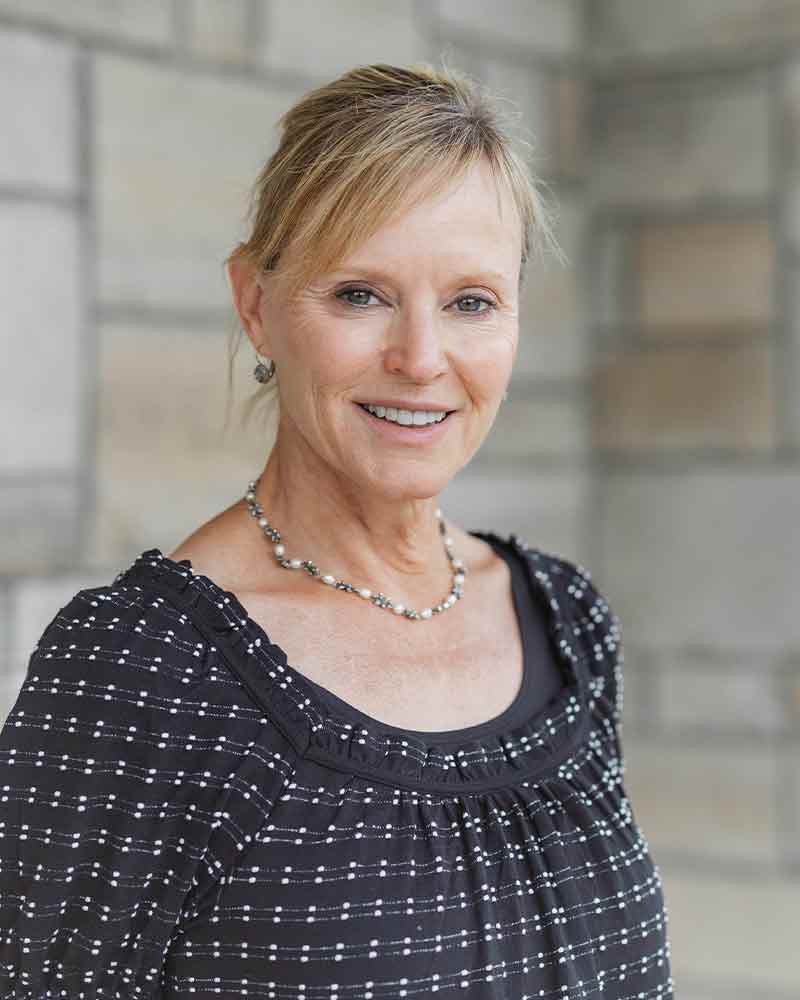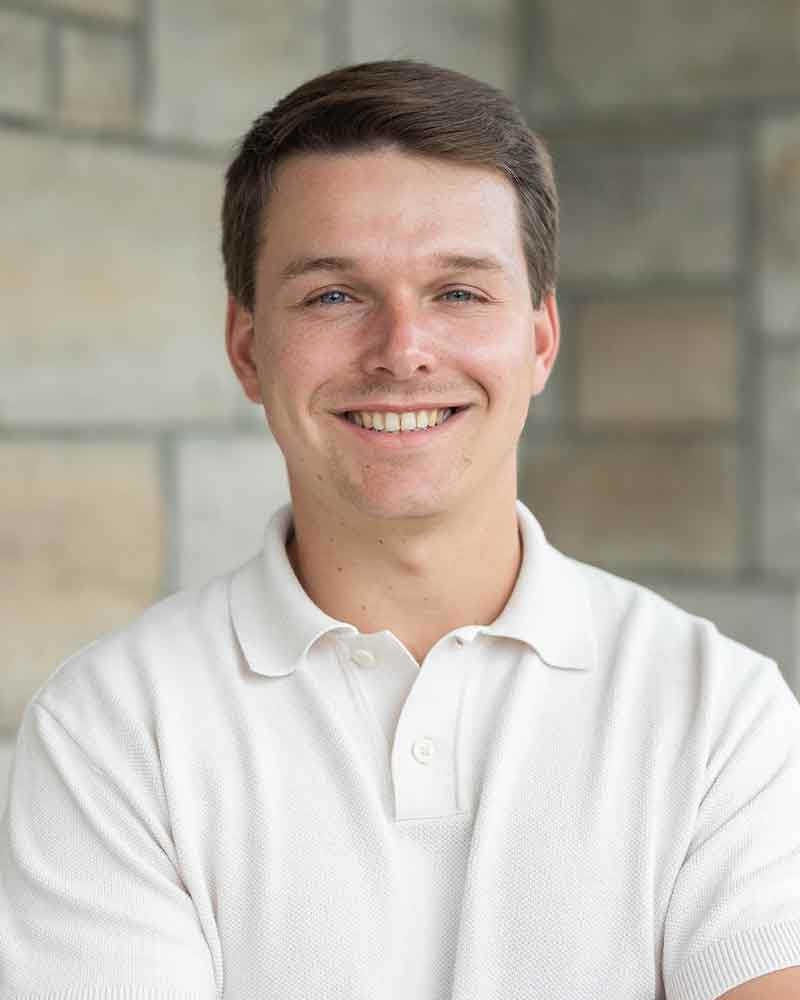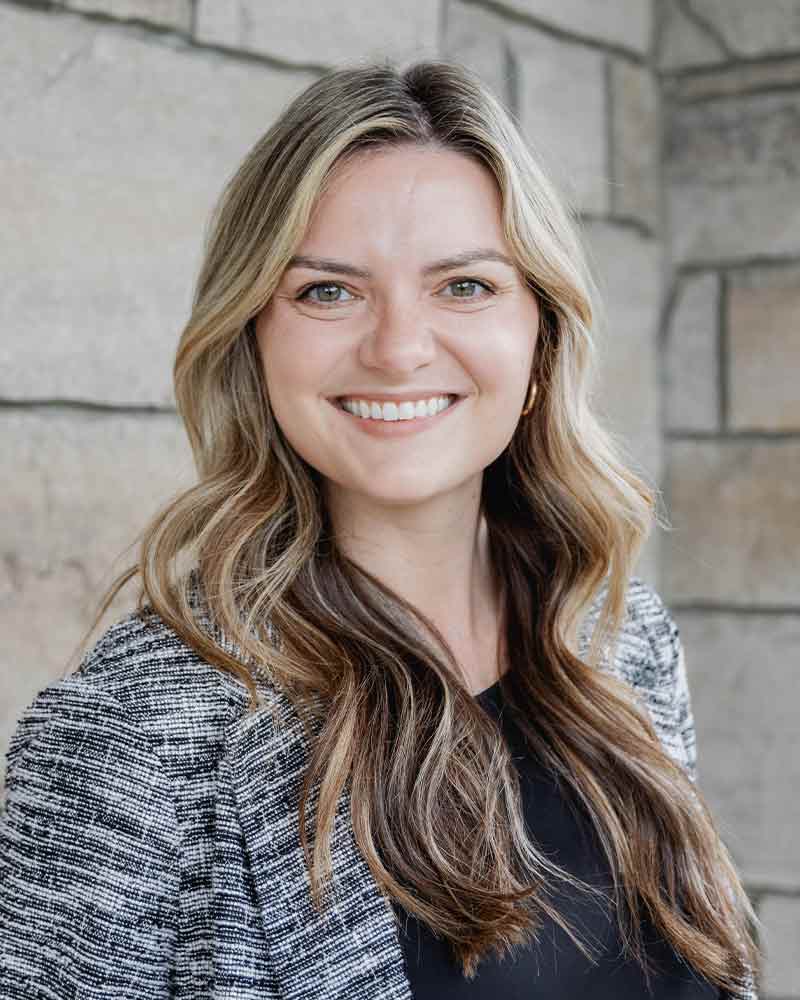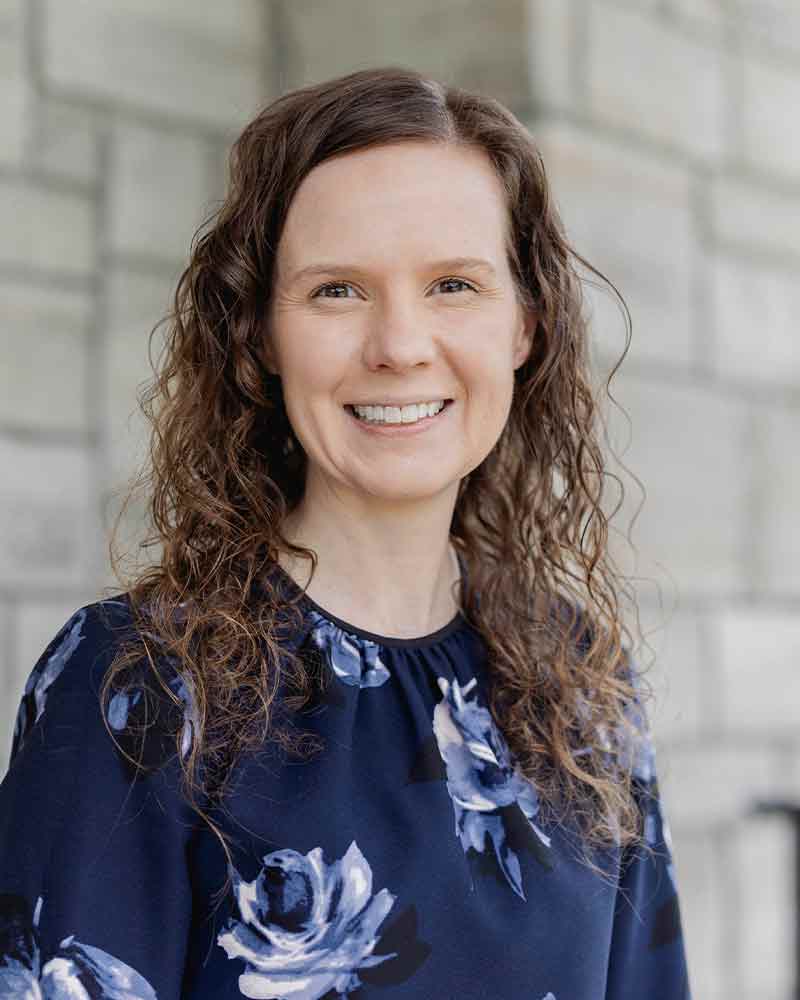Physician Assistant Master’s Degree in Medicine (MSM)
Trevecca’s physician assistant (PA) program equips graduates to serve their communities through professional clinical practice. Our program is the first and longest-tenured program in Tennessee, offering all new on-campus facilities and clinical experiences in diverse settings.
Want More Info?
Program Mission
The mission of Trevecca’s PA program is to prepare professionally competent physician assistants who will use their skills to serve their communities in compassionate ministry.
Value and Vision Statement
The Trevecca PA Program values experiential differences, service-mindedness, empathy and determination. Our foundation is built on leadership and service, and we hold professionalism, integrity, equanimity, humility and capacity for growth in the highest regard. Our vision is to provide a culture where our students are transformed through their PA educational experience, equipping them to intentionally impact the lives of their patients and community.
Program Benefits
- History of Excellence
Graduate from Tennessee’s first and longest-tenured PA program, featuring a 99% PANCE first-time pass rate. - Collaborative Culture
Complete your degree with a supportive cohort of students who are working toward similar goals. - Accessible & Experienced Faculty
Learn from faculty who possess the highest degrees in their fields and have relevant and valuable real-world experience. - State of the Art Facilities
Develop hands-on expertise in our new facilities, complete with a dedicated 8-cadaver lab. - Career Connections
Earn your degree in the nation’s healthcare capital. - International & Domestic Rotations
Hone your skills while helping others through international, faith-based and underserved clinical rotation options
New Facilities
To celebrate more than 45 years of training excellence, Trevecca recently completed a new Health Sciences Building.
This four-story addition to the Greathouse Science Building provides a state of the art environment for instruction and interaction. It features a dedicated eight-cadaver lab and adds 33,000 square feet of classroom, lab and other spaces to Trevecca's campus.
These new facilities give Trevecca Health Sciences room to nurture collaboration and innovation. Our new home is a place where future PA students can thrive as they welcome a new era, building on a legacy that revolves around our supportive, student-centric community.
What to Expect
As a student in Trevecca’s Master of Science in Medicine (MSM) for physician assistants, you’ll be part of a highly respected PA program that’s been growing and succeeding for more than four decades. The superior quality of Trevecca’s PA program exists to help you succeed. Our graduates consistently pass the Physician Assistant National Certifying Exam (PANCE) at rates above the national average. In the past five years, graduates from our program have an average first-time pass rate of 99 percent.
Before your program even begins, we offer optional, self-directed learning that covers important topics in science to prepare you to start strong. Once you are in the program, our curriculum prepares you to provide patient-centered healthcare in diverse populations and settings. You’ll be taught the ethical, legal and regulatory standards you need to be part of an interprofessional, collaborative team. You’ll also have the opportunity for in-lab learning with eight cadavers exclusively used by PA students.
The program is divided into two phases: didactic and clinical. During the didactic phase, students spend 15 months in courses focusing on the medical sciences and clinical medicine. They will then progress to a 12-month period where they will participate in eight clinical rotations in the following areas: family medicine, pediatrics, behavioral and mental health, internal medicine, emergency medicine, women's health, surgery and an elective of your choice.
Why Choose Trevecca?
 Founded in 1901, Trevecca has been recognized nationally and locally for providing our students with the highest level of academic quality and rigor. Trevecca's PA program was the first in Tennessee, established in 1976, and has graduated over 1300 PAs. Our alum work across the country and internationally carrying on the strong legacy of Trevecca PAs.
Founded in 1901, Trevecca has been recognized nationally and locally for providing our students with the highest level of academic quality and rigor. Trevecca's PA program was the first in Tennessee, established in 1976, and has graduated over 1300 PAs. Our alum work across the country and internationally carrying on the strong legacy of Trevecca PAs.
We offer a holistic education focused on transforming the intellectual, social, emotional, physical and spiritual health of all the students in our diverse student body. As a Christian university, we offer programs that explore the ways faith and healthcare intersect. Our PA program prioritizes compassion, integrity and a biblical worldview.
Throughout the program, you’ll participate in learning experiences at local organizations that reach Nashville’s medically underserved and homeless population. Our program also offers opportunities for clinical experiences at faith-based clinics in both urban and rural settings. If you are interested in medical missions, you may have opportunities to participate in foreign mission trips and international clinical rotations. Students have served in a number of countries including Ghana, Zambia, Swaziland, Haiti and Peru.

Course Descriptions
Get details on all the courses you’ll complete as you work toward this degree at Trevecca.
Read More- Admissions
- Admission Requirement Summary
- Tuition & Costs
- Technical Standards
- Curriculum
- PANCE Data
- Attrition Data
- Program Goals
- Program Competencies
- Accreditation
- Preceptors
- STEM PA Scholar Pathway (Pre PA Pathway)
- Virtual Tour
- Student Policies
Admissions
The Trevecca PA Programs strives to select a cohort prepared to succeed both academically and professionally while possessing the character and values suited to fulfill our mission.
It is our goal to assure our graduates are fully competent physician assistants capable of fulfilling the Hippocratic oath “to benefit and do no harm.” Applicants admitted to the program must meet our academic and technical standards and possess the intelligence, integrity, compassion, humanitarian concern, and physical and emotional capacity necessary to practice medicine.
Application Submission and Review
We are mission-driven and strive to recruit students who are committed to serving their communities in compassionate ministry. To assess applicant’s align with Trevecca’s mission, we conduct a holistic review that incorporates academic preparedness, patient-care experience, PA shadowing, letters of recommendation and demonstrated character and values.
Applications are only reviewed after being verified by the Central Application Service for Physician Assistants (CASPA) service.
How to Apply
-
Complete a CASPA application and submit all transcripts and any additional documentation directly to CASPA.
-
Applications must have a “completed” status in CASPA by October 1 to be considered for an interview.
-
All shadowing and direct patient care minimum hours must be reflected within the application at the time of submission to CASPA.
The PA program utilizes the Centralized Application Service for Physician Assistants (CASPA) which opens at the end of April.
Questions Regarding Application
-
Contact the PA Admissions Team at (615) 248-1363 or dldemana@trevecca.edu
-
For tech support for the CASPA application, please call 240-497-1985 or e-mail apply@caspaonline.org
Interviews and Offers
We begin interviewing in mid-summer and continue until the class is full. For optimal consideration, applicants should complete all science prerequisites by August 15 of their application year.
All graduates from Trevecca or Olivet Nazarene University who meet TNU PA program admissions criteria will be offered a minimum of an interview within our standard admissions process for the PA program and the potential to qualify for one of ten early assurance seats offered each year.
All notifications of admission status will be communicated to the applicants by email within CASPA.
Offers of admission are extended on a rolling basis and will continue to be made until a full cohort of fifty students are selected. Once an offer is made, an applicant must pay a $500 deposit to hold their seat, and a second $500 deposit two months later.
Admission Statistics for Most Recent Admitted Cohorts
|
Cohort |
Cumulative Undergraduate GPA [Minimum 3.25] |
Overall Science GPA [Minimum 3.25] |
Average # of Additional Upper-Level Science Courses |
|
CO2026 |
Average 3.78/Range 3.49-4.0 |
Average 3.68/ Range 3.27-4.0 |
5 |
|
CO2027 |
Average 3.81/Range 3.48-4.0 |
Average 3.75/ Range 3.36-4.0 |
5 |
Note:
*Meeting minimum admission requirements does not guarantee an interview or acceptance.
**The Trevecca PA Program extends an invitation to interview to any Trevecca or Olivet Nazarene University graduate who meets all admissions requirements.
***Applicants who have been dismissed from another PA program are not eligible for admission to the Trevecca PA program.
What We Look for in Applicants
While meeting the minimum admission requirements is essential, most accepted applicants go above and beyond. The Trevecca PA program gives preference to applicants who demonstrate academic strength through:
-
Higher overall GPAs
-
High science GPAs
-
Substantial upper-level science coursework
-
Completion of science courses at a regionally accredited four-year university
Additional qualities we value include:
-
Strong interpersonal skills
-
Clear evidence of academic rigor and preparedness
Academic excellence may be demonstrated by:
-
Maintaining high grades while managing a full-time course load and significant extracurricular commitments
-
Completing additional upper-level science courses (see our recommended list)
-
Taking two or more laboratory sciences concurrently across multiple semesters
-
Earning an honors undergraduate degree
Applicants who exhibit these qualities present a stronger, more competitive application. We encourage you to challenge yourself academically and highlight your achievements—both personally and academically—to submit the most compelling application possible.
Prerequisite Coursework Requirements
-
Human Anatomy and Human Physiology with lab – 8 credits
-
General Chemistry I and II with lab – 8 credits
-
Microbiology with lab - 3 or 4 credits
-
General Psychology – 3 credits
-
Medical Terminology – minimum one credit/certificate
-
Please note: Developmental psychology is no longer a prerequisite requirement.
-
No online or hybrid courses for science prerequisites will be accepted except for those covered by the COVID-19 Policy.
-
Science courses labeled as "survey" or "introductory" will not be accepted (for clarification, please contact us for approval).
-
Online course options may only be used to complete the psychology course requirements and/or medical terminology course.
Science Prerequisite Expiration Policy
To ensure academic readiness, the following guidelines apply:
- Expired Courses: Science courses are considered expired if completed seven or more years prior to May of your program start year.
- Refresher Requirement: A refresher must include at least one semester of the expired science course or a higher-level version of that course. If both courses in a required series are expired (i.e., Chem I and II), a minimum of one semester is required to refresh the content of that series.
If your anatomy and physiology courses are more than five years old at the time of matriculation, we strongly recommend completing an updated or refresher course. Doing so ensures you have the most current knowledge and are well-prepared for the demands of the program.
If one of the required science prerequisite courses is expired, a refresher course must be completed.
Additional Upper-Level Science Courses
Admission to the Trevecca PA program is highly competitive. To strengthen your application and enhance your readiness for the rigorous curriculum, we strongly encourage applicants to complete additional upper-level science courses. These courses demonstrate academic excellence and provide a solid foundation for success in the program.
Accepted students typically complete an average of 3–7 additional upper-level science courses. The following is a list of additional courses that will assist you in increasing the competitiveness of your application:
- Biochemistry I & II*
- Cellular Biology
- Organic Chemistry I & II
- Genetics*
- Immunology*
- Molecular Biology
- Pathophysiology
- Physics I & II
*These courses have demonstrated greater relevance to PA curricula.
It is common for applicants to exceed all minimum admissions requirements. Statistics for the cohort of 2026 include the following ranges and average:
- Undergrad Cumulative GPA: range 3.37-4.0 with average 3.77
- Overall Science GPA: range 3.27-4.0 with average 3.68
Patient Care Hours
All applicants must log a minimum of 250 hours of direct patient care at the time of submission of the application. The following positions qualify for direct patient care hours:
- Medical assistant, patient care technician, surgical technician, first assistant, scribe
- CNA, LPN, RN, EMT/paramedic, OT/PT or OT asst./PT asst., AT-C, phlebotomist, RT, ER technician
- Lab technician, certified pharmacy technician, clinical dietician
- These job titles may only be used if phlebotomy or direct patient care is the majority of job description.
Special Considerations
Trevecca has created the STEM PA Scholar Pathway for students majoring in STEM programs at Trevecca and Olivet Nazarene Universities (with the exception of nursing). Students participate in a tailored academic experience to prepare for application to PA schools such as Trevecca’s. After completing an undergraduate STEM degree and meeting all prerequisite requirements, qualifying candidates in the Pathway receive either a guaranteed interview or early assurance of a guaranteed seat in the PA Program.
- Information sessions for TNU STEM PA Scholar Pathway occur each fall
- Applications for candidacy into the STEM PA Scholar Pathway are due by the end of February of the sophomore year.
- Candidacy interviews will occur each spring
If you are interested in applying or have additional questions on how to qualify, please email Katrina Gill, Director of PA Admissions at kgill@trevecca.edu.
International Students
- All admission requirements and policies apply to international applicants. All international applicants must complete fifteen (15) semester hours at a regionally accredited United States institution. Nine (9) of the fifteen (15) hours must be prerequisite science courses. For applicants who have completed foreign courses, please submit your coursework to the World Education Services (WES), Inc. WES will then send your report directly to CASPA.
- Applicants whose native language is not English are required to take the Test of English as a Foreign Language (TOEFL). A minimum score of 550 is required on the paper-based test or 213 on the computer-based test. On the computer-based TOEFL, we require a total score of 80 with 20 on each section (listening, speaking, reading and writing).
- Trevecca’s Certification of Financial Support must be on file at the time an I-20 form is issued. The same financial policies apply to international students as they apply to US citizens and US residents. Only international students with a valid F1 visa will be permitted to register for financial aid.
- To apply for an F1 visa, you must first apply for admission to the TNU Physician Assistant Program. After acceptance into the program, you will be required to provide a bank statement showing sufficient funds for one year of living expenses and tuition in the US. After the documents are received, we will then issue you an I-20 document, which is the form needed to apply for the F-1 visa through the US embassy in your country.
Admission Requirement Summary
- Prerequisite courses:
- Human Anatomy and Human Physiology with lab – 8 credits
- A refresher course(s) is recommended for applicants whose coursework in these subject areas was completed five or more years from the start of the program.
- General Chemistry I and II with lab – 8 credits
- Microbiology with lab - 3 or 4 credits
- General Psychology – 3 credits
- Medical Terminology – minimum one credit/certificate
- Please note: Developmental psychology is no longer a prerequisite requirement.
* All science prerequisites must be taken in person.
**The science prerequisite courses must be completed less than seven years prior to the program start date.
- Human Anatomy and Human Physiology with lab – 8 credits
- Degree requirements
- A bachelor’s degree from a regionally accredited four-year university within the US or an equivalency from an international institution.
- International students are welcome to apply. All requirements must be met including submission of your transcripts to the World Education Services (WES). Please see the international applicants’ section for more information.
- GPA Requirements
- Cumulative undergraduate GPA of 3.25 or higher
- Overall science GPA of 3.25 or higher
- Standardized Exams
- The program does not require the GRE or the PA-CAT
- Direct patient care hours: A minimum of 250 hours must be logged at the time of application.
- Shadowing: A minimum of 10 hours at the time of application
- Letters of recommendation: Three letters of recommendation including one from a PA/MD/DO/NP who has directly observed you in a healthcare setting.
- Technical standards: All accepted applicants must possess the capacity to meet required technical standards. Please refer to the Technical Standards tab for more information.
- Advanced placement: No advanced placement is given regardless of academic background.
- Background statement
- Applicants must self-report any misdemeanor, felony, and/or dismissals. If a student fails to report an incident and it is subsequently discovered, their offer of acceptance to Trevecca’s PA Program may be revoked. A certified background check will be performed prior to matriculation, and any positive report may also result in a revocation of an offer or acceptance.
*Meeting all admissions requirements does not guarantee an interview.
Year One
DIRECT COST OF ATTENDANCE (Three Semesters)
|
Direct Costs |
Summer I |
Fall I |
Spring I |
Total |
|
Tuition |
$17,143.00 |
$17,143.00 |
$17,143.00 |
$51,429.00 |
|
Fees |
$555.00 |
$555.00 |
$555.00 |
$1,665.00 |
|
Background Check |
$60.00 |
|
|
$60.00 |
|
Urine Drug Screening |
$31.00 |
|
|
$31.00 |
|
Immunization Tracking |
$50.00 |
|
|
$50.00 |
|
|
|
|
|
|
|
|
$17,839,00 |
$17,698,00 |
$17,698,00 |
$53,235.00 |
*Direct costs are expenses that are directly attributed to the educational program.
ESTIMATED INDIRECT COSTS
All indirect costs are estimates and may be higher or lower based on students’ personal choice in housing and other expenses.
|
Indirect Costs |
Summer I |
Fall I |
Spring I |
Total |
|
**Medical Equipment Total (estimate) |
$1200.00 |
|
|
$1200.00 |
|
White Coat Estimate |
$100.00 |
|
|
$100.00 |
|
Scrubs (1 pair) |
$75.00 |
|
|
$75.00 |
|
Housing allowance (room, board, utilities) |
$5,215.00 |
$5,215.00 |
$5,215.00 |
$15,645.00 |
|
Transportation |
$1105.00 |
$1105.00 |
$1105.00 |
$3,315.00 |
|
Personal Expense |
$3,718.00 |
$3,718.00 |
$3,718.00 |
$11,154.00 |
|
|
|
|
|
|
|
Total Estimated Indirect Costs |
$11,413.00 |
$10,038.00 |
$10,038.00 |
$31,489.00 |
**Medical equipment fee may be less than the projected amount.
Year Two
DIRECT COST OF ATTENDANCE (Four Semesters)
|
Direct Costs |
Summer II |
Fall II |
Spring II |
Summer III |
Total |
|
|
Tuition |
$17,143.00 |
$17,143.00 |
$17,143.00 |
$17,143.00 |
$68,572.00 |
|
|
Fees |
$555.00 |
$555.00 |
$555.00 |
$555.00 |
$2,222.00 |
|
|
Background Check |
$60.00 |
|
|
|
$60.00 |
|
|
Urine Drug Screening |
$31.00 |
|
|
|
$31.00 |
|
|
Immunization Tracking |
$50.00 |
|
|
|
$50.00 |
|
|
|
|
|
|
|
|
|
|
|
$17,839,00 |
$17,698,00 |
$$17,698,00 |
$17,698,00 |
$70,935.00 |
|
ESTIMATED INDIRECT COSTS
All indirect costs are estimates and may be higher or lower based on students’ personal choice in housing and other expenses
|
Indirect Costs |
Summer II |
Fall II |
Spring II |
Summer III |
Total |
|
Housing allowance (room, board, utilities) |
$5,215.00 |
$5,215.00 |
$5,215.00 |
$5,215.00 |
$20,860.00 |
|
Transportation |
$1105.00 |
$1105.00 |
$1105.00 |
$1105.00 |
$4,420.00 |
|
Personal Expense |
$3,718.00 |
$3,718.00 |
$3,718.00 |
$3,718.00 |
$14,872.00 |
|
|
|
|
|
|
|
|
Total Estimated Indirect Costs |
$10,038.00 |
$10,038.00 |
$10,038.00 |
$10,038.00 |
$40,152.00 |
Technical Standards
Technical standards are established to align with the program curriculum. Accepted students must possess cognitive, physical, and behavioral skills that ensure they can acquire the knowledge and skills necessary to provide effective care as a physician assistant. The program follows all admissions requirements and technical standards when making their admissions decisions.
Applicants to the Trevecca Nazarene University Physician Assistant Program must meet the technical standards outlined by the Program and the University. We recognize that degrees of ability vary between students. Applicants who are otherwise qualified but require reasonable accommodation should contact Trevecca Nazarene University Disability Services. All Technical standards must be met with or without accommodation. We welcome all who meet minimal admissions requirements to apply.
The following Technical Standards identify the Program’s requirements for admission.
Observation
Observation includes the use of the sense of vision, both near and far, as well as other senses and modalities (smell, hearing, etc.) to facilitate knowledge. The candidate must be able to observe content including, but not limited to, demonstrations, illustrations, microscopic studies, and patient physical condition. These skills are necessary to accurately diagnose and develop treatment plans.
Communication
Communication involves the ability to speak clearly, interpret, and observe patients. Effective communication includes speaking fluently and effectively with sensitivity and compassion toward patients. Additional required communication skills include comprehension and composition of written documentation, allowing candidates to work effectively and efficiently as part of a medical care team.
Motor
Motor functions are an integral part of the diagnostic process. Candidates should be able to perform maneuvers such as palpation, auscultation, and percussion. Additionally, candidates should be able to perform diagnostic procedures (e.g., lumbar puncture, skin biopsy) and emergency treatments (e.g., suturing, splinting, incision and drainage) which require gross and fine motor skills to ensure the highest level of patient care.
Cognitive/Conceptualization
The ability to synthesize, retain, and apply a wide breadth of complex information indicates that candidates must be alert and attentive. Candidates will experience their curriculum through a variety of modalities. It is important that they can integrate knowledge presented in diverse ways. This includes the ability to comprehend spatial relationships and three-dimensional models.
Behavioral/Social
The practice of medicine includes many legal and ethical aspects. Candidates must be able to relate to their patients and families in a way that shows dignity, respect, and compassion. The well-being of the patient should be primary. Candidates should be able to complete multiple tasks and functions under stress. They should be able to adapt to the needs of their patients and exhibit empathy and integrity throughout their education and their medical career.
Curriculum
The curriculum is divided into didactic and clinical phases. The didactic phase is 15 months during which students concentrate on learning the medical sciences such as anatomy, physiology, pathophysiology, and pharmacology. In the second semester of the didactic year, students start clinical medicine where they learn about diseases in each organ system of the body.
Once the didactic phase is completed, students progress to the clinical phase where they complete eight clinical rotations over a 12-month period. Core rotations include family medicine, pediatrics, behavioral/mental health, internal medicine, emergency medicine, surgery, women’s health, and one elective.
Rotations are six weeks in length. Reliable transportation is required. All expenses related to travel, meals, and lodging during rotations are the responsibility of the student.
Students are discouraged from employment while in the PA program due to the demands of the Program.
At the completion of all curriculum requirements, the Master of Science in Medicine (MSM) degree will be awarded.
Trevecca physician assistant students consistently score above the national average on the Physician Assistant National Certifying Exam (PANCE). View the TNU PA Program Performance Summary Report here.
Here is more information about our exam results:
- Congratulations to the class of 2025 for their 100% first-time test taker pass rate.
- Classes of 2016, 2017, 2021 - 2025 each achieved a first-time test taker pass rate of 100%
Pass rates of first-time test takers
5-year national average:
93%
5-year average for Trevecca PA Program graduates:
100%
Attrition Data Table
|
Graduated Classes |
|||
|
Class of 2023 |
Class of 2024 |
Class of 2025 |
|
|
Maximum entering class size (approved by ARC-PA) |
50 |
50 |
50 |
|
Entering class size |
51 |
50 |
50 |
|
Graduates |
51 |
49 |
50 |
|
*Attrition rate |
0.00% |
2.00% |
0.00% |
|
**Graduation rate |
100% |
98% |
100% |
Comments: Calculated attrition rates are inclusive of all students who did not complete the program for any reason. The statistics for attrition encompass several underlying variables, including, but not limited to, academic performance, voluntary withdrawal, medical/personal leave of absence, disciplinary action, and deceleration. Accordingly, attrition and graduation rates for any given year are multifactorial and should not be interpreted solely as a measure of academic failure or success.
*Attrition rate calculation: Number of students who attrited from cohort (decelerated + withdrawals + dismissals) divided by the (entering class size + number joining class cohort).
**Graduation rate calculation: Number of cohort graduates divided by the (entering class size + number joining class cohort).
Program Goals
1. Recruit and enroll students who meet or exceed the program’s academic admission standards and successfully pass the PANCE.
The program is committed to recruiting and enrolling students who demonstrate strong academic preparation for physician assistant school. By prioritizing applicants who meet or exceed established admission standards, the program ensures that incoming cohorts possess the foundational knowledge necessary for rigorous graduate-level training. This strategic approach directly supports the program’s mission to graduate competent Physician Assistants who are prepared to pass the Physician Assistant National Certification Exam (PANCE).
2. Cultivate graduates who recognize the value of service in communities.
Fundamental to our program’s mission and values is our intention to prepare our graduates to employ their knowledge, skills, and resources in compassionate service. We do so by providing program-sponsored opportunities for our students to serve communities through Nashville-area nonprofits and to participate in clinical rotations that care for medically underserved populations, both in the U.S. and internationally. We also encourage our students to reflect on the value of these experiences and to personally commit to supporting future community service/missions after graduation.
3. Provide a comprehensive educational experience that enables students to acquire the essential knowledge and skills for entry-level practice as a PA.
Our program-defined competencies required of all graduating students encompass knowledge for practice, interpersonal and communication skills, patient-centered care, professionalism, and practice-based learning and improvement. We have designed a curriculum of sufficient depth and breadth in both the didactic and clinical phases to address these competencies and allow us to be confident that all of our graduates are ready for entry-level PA practice.
4. Foster a highly supportive educational community dedicated to student retention and success.
Our program endeavors to challenge our students to excel and achieve their fullest potential within a strongly supportive learning community. We are committed to the success of each student admitted to our program; thus, we strive to maintain a high graduation rate. Additionally, we seek to develop encouraging, mentoring relationships between faculty/staff and students that promote ongoing holistic growth and excellence, as well as close-knit student-peer relationships that encourage camaraderie and teamwork. Methods by which this is accomplished include strong academic advising support; formative educational experiences with intentional one-on-one or small group faculty-student coaching; student learning activities that facilitate interpersonal student interaction and teamwork; class officer appointments that model leadership and service to one’s cohort; and the intentional design of facility spaces to allow for small group learning.
Trevecca PA Program competencies are foundational to a comprehensive educational experience. They define the necessary professional knowledge, skills, and attitudes required of our new graduates to provide high-quality, patient-centered care. Our curriculum is designed to help students attain each program competency in a supportive educational community and ultimately to prepare them for entry-level PA practice.
Our competencies are informed by the mission, values, and goals of the Trevecca Nazarene University PA Program and modeled after PAEA’s Core Competencies for New Physician Assistant Graduates, and the Competencies for the Physician Assistant Profession by the four national PA organizations.
Medical Knowledge (MK)
1. Students will demonstrate knowledge of basic sciences and clinical medicine in all organ systems across the lifespan in a variety of health care delivery settings.
- End-of-Curriculum Exam
- Summative OSCE
- Patient Education OSCE
- Summative Technical Skills Exam
Interpersonal Skills (IS)
2. Students will demonstrate interpersonal communication skills that result in an effective exchange of information with patients.
- Summative OSCE
- Patient Education OSCE
3. Students will be able to accurately articulate one's role and responsibilities to patients.
- Summative OSCE
- Patient Education OSCE
4. Students will be able to discuss diagnosis and treatment plans compassionately and accurately with patients.
- Summative OSCE
- Patient Education OSCE
5. Students will be able to accurately and concisely communicate the findings of a given patient encounter to members of the health care team.
- Summative OSCE
Clinical and Technical Skills (CTS)
6. Students will be able to perform health histories and physical examinations on patients across the lifespan in a variety of health care delivery settings.
- Summative OSCE
7. Students will be able to select the appropriate laboratory and diagnostic studies based on clinical presentation across acute, chronic, and emergent care settings.
- End-of-Curriculum Exam
- Summative OSCE
8. Students will be able to interpret laboratory and diagnostic studies based on clinical presentation across acute, chronic, and emergent care settings.
- End-of-Curriculum Exam
- Summative OSCE
9. Students will be able to formulate and prioritize a differential diagnosis based on clinical presentation across acute, chronic, and emergent care settings.
- End-of-Curriculum Exam
- Summative OSCE
10. Students will be able to develop patient-centered management plans that incorporate both pharmacological and non-pharmacological approaches across acute, chronic, and emergent care settings.
- End-of-Curriculum Exam
- Summative OSCE
11. Students will be able to demonstrate proficiency in performing clinical procedures commonly performed in acute and emergent settings.
- Summative Technical Skills Exam
12. Students will be able to refer patients to the appropriate health care provider for continued management.
- End-of-Curriculum Exam
13. Students will be able to provide patient-centered education across the lifespan in acute, chronic and emergent care settings.
- End-of-Curriculum Exam
- Patient Education OSCE
Professional Behaviors (PB)
14. Students will be able to demonstrate professional conduct expected of a practicing physician assistant and as expected by the medical profession.
- Summative OSCE
- Patient Education OSCE
15. Students will be able to demonstrate professional behaviors during collaboration with other members of the healthcare team.
- Summative OSCE
Clinical Reasoning and Problem-Solving Abilities (CRP)
16. Students will be able to recognize healthy versus ill patients across the lifespan based on the clinical presentation, physical examination, laboratory, and diagnostic study findings.
- End-of-Curriculum Exam
- Summative OSCE
17. Students will be able to demonstrate critical reasoning by developing appropriate plans of care for acute, chronic, and emergent conditions.
- End-of-Curriculum Exam
- Summative OSCE
At its March 2025 meeting, the Accreditation Review Commission on Education for the Physician Assistant, Inc. (ARC-PA) extended Accreditation-Probation status for the Trevecca Nazarene University Physician Assistant Program sponsored by Trevecca Nazarene University until its next review in March 2027.
Probation accreditation is a temporary accreditation status initially of not less than two years. However, that period may be extended by the ARC-PA for up to an additional two years if the ARC-PA finds that the program is making substantial progress toward meeting all applicable standards but requires additional time to come into full compliance. Probation accreditation status is granted, at the sole discretion of the ARC-PA, when a program holding an accreditation status of Accreditation - Provisional or Accreditation - Continued does not, in the judgment of the ARC-PA, meet the Standards or when the capability of the program to provide an acceptable educational experience for its students is threatened.
Once placed on probation, a program that fails to comply with accreditation requirements in a timely manner, as specified by the ARC-PA, may be scheduled for a focused site visit and is subject to having its accreditation withdrawn.
Specific questions regarding the Program and its plans should be directed to the Program Director and/or the appropriate institutional official(s).
The program’s accreditation history can be viewed on the ARC-PA website at:
https://www.arc-pa.org/accreditation-history-trevecca-nazarene-university/
Accreditation FAQs
Is a program on probation still accredited?
Yes. Accreditation-Probation is a temporary accreditation status initially of not less than two years.
How will the Accreditation-Probation status affect future entering classes?
The program will continue to admit students during its regular admissions cycle. The program may admit future cohorts under the current Accreditation-Probation status.
How will the Accreditation-Probation status affect the current staff and faculty support for newly admitted students, current students, and alumni?
The program will continue to provide the resources necessary to our students, past and present.
How does the program’s Accreditation-Probation status affect my degree from Trevecca?
There is no effect on your degree. You will still earn a MSM degree once you meet the degree requirements and will be awarded your degree as scheduled.
If the program is on probation, can I take the PANCE?
Yes. The program is fully accredited, which allows all program graduates to take the PANCE.
Can I apply for licensure if the program I graduated from is on Accreditation-Probation status?
Yes. The primary requirements for licensure are graduation from an accredited program and NCCPA certification. The program remains fully accredited.
The program I am considering is on probation. If I enter that program, will I be graduating from an accredited program?
Probation is an active accreditation status and those entering a program that is on probation are entering a program that is fully accredited. In order to be eligible to take the PANCE, students must successfully complete a program that was accredited at the time the student matriculated. It is best to check with the NCCPA concerning exam eligibility criteria.
Preceptors
Trevecca partners with medical professionals who can offer hands-on training to PA students. Licensed physician assistants, nurse practitioners, doctors of medicine and doctors of osteopathic medicine are invited to apply to serve as clinical preceptors.
Why be a preceptor?
- Invest in the next generation of healthcare providers
- Become eligible as a regular preceptor to receive a precepting stipend
- Evaluate possible future employees
- Add an educational component to your CV
- Serve in a guest lecturing role in the classroom
- Earn CME credits
- Add energy and enthusiasm to your practice through student participants
What are the responsibilities?
- “See one. Do one. Teach one.” Introduce students to new skills and procedures
- Offer training to master’s-level PA students for a clinical rotation
- Provide feedback on student performance
- Share opportunities and knowledge gained during practice
- Be an example of professionalism
- Grow a student’s communication skills
- Connect students with professionals in other areas
- Set the student’s schedule based on the provider’s schedule
What sets Trevecca’s PA program apart?
Trevecca is home to the first and longest-running Physician Assistant Master of Science in Medicine degree in Tennessee. Since 1976, the University has graduated more than 1,300 students who’ve gone on to serve successfully in a variety of healthcare careers. Our program emphasizes both academic excellence and a mindset of compassion and integrity.
Throughout the last five years, the average first-time PANCE pass rate for Trevecca students has been 99 percent. In recent years our graduates have scored above the national average on every organ system section of the exam.
STEM PA Scholar Pathway (Pre PA Pathway)
Beginning in 2021, undergraduate Trevecca students with Biology major/Chemistry minors, who met all criteria, were eligible to interview for a Pre-PA Pathway candidacy which allowed for a tailored undergraduate academic experience in preparation for application to a competitive PA school such as Trevecca’s. Two options within the pathway were a guaranteed seat or a guaranteed interview for the Trevecca PA Program. A maximum of 10% of the cohort seats were designated for this purpose.
In the Fall of 2024, Trevecca will be transitioning the previous Pre PA Pathway to our new STEM PA Scholar Pathway. This new opportunity allows for qualifying undergraduate Trevecca students across all STEM majors to tailor their education in preparation for becoming a PA. In addition, the advantage of this educational pathway gives a greater number of our students the potential to qualify for a guaranteed seat, as a sophomore, into our historically recognized PA program upon completion of their undergraduate STEM degree from Trevecca.
If you are interested in applying or have additional questions on how to qualify, please email Teresa Vines, PA Program Admissions Coordinator, at tvines@trevecca.edu.
Health Sciences Walkthrough
Trevecca campus tour
Student Policies
- Tuition Fees Refunds
- PA Program Not Requiring Prospective & Enrolled Students to Provide SCPE Sites or Preceptors
- Student Health Screening and Immunization Policy
- PA Student Exposure to Infectious and Environmental Hazards Policy
- PA Program Faculty & Directors Precluded from Providing PA Students Health Care
- PA Program Goals
- Trevecca Nazarene University Physician Assistant Program Competencies
- Processing Student Allegations of Harassment
- Timely Access and/or Referral of Students to Services Addressing Personal Issues
- Academic Progression, Promotion and Completion Policy
- Remediation and Assessment Policy
- Program Deceleration Policy
- Program Withdrawal Policy
- Program Dismissal Policy
- Student Grievances and Appeal Policies
- Program Travel Policy
- Student Employment Policy
Career Opportunities
The demand for the occupation of physician assistant is projected to increase 28 percent by 2031. As a graduate of our PA program, you’ll be ready to advance your career and tap into higher earning potential. Your degree will position you to serve as a PA in any medical setting, including:
- Outpatient, inpatient, surgical and emergency/acute care
- International and compassionate medical ministry
- General practice or specialty care, serving patients of any age
- Leadership, advocacy, education and research
“I could not be more grateful for my experience at Trevecca. The program not only provided me with the medical skills and knowledge to become a competent PA, but it expanded my ability to face challenges, deepened my faith, gave me lifelong friendships and ultimately helped me become a better version of myself.”
Our Faculty
-

Sandy Anderson
Didactic Coordinator
-

Morgan Brown
Clinical Faculty, Part Time
Read Full BioMrs. Brown grew up in Spencer, West Virginia and received her B.S. in Biology from Marshall University. She always knew she wanted to practice in a profession in a field that would allow her to take care of others and later determined a physician ...
-

Deirdre Demana
Admissions Coordinator
-

Kathleen Flach
Program Director, Physician Assistant Program
Read Full BioKathleen joined the Trevecca Nazarene University PA Program in June 2024 as the Program Director. She received her MMS from Nova Southeastern University in physician assistant studies, her M.Ed. from Vanderbilt University in health promotion and ...
-

Katrina Gill
Director of PA Program Admissions, PA Liaison for External Relations
Mrs. Gill was raised in Franklin, Tennessee and attended the University of Tennessee, Knoxville for her bachelor’s in nursing. After graduating, she married her husband, Byron, and worked in Nashville as a Surgical ICU and PACU Nurse. After being ...Read Full Bio -

Eric Greenfield
Medical Director
Dr. Greenfield serves as the medical director for the PA program. He completed his doctorate in osteopathic medicine from Ohio University, a Master’s in Management in Healthcare from Vanderbilt University, and multiple degrees in health ...Read Full Bio -

Courtney Harris
Professor of Pharmacotherapeutics
Courtney was born and raised in Nashville, TN. She received her B.S. at Harding University followed by a Pharm.D. at Lipscomb University College of Pharmacy. After graduation, she taught one semester as an adjunct professor and then joined the ...Read Full Bio -

Laura Kigweba
Assistant Professor
Read Full BioLaura was born and raised in Augusta, GA, and received her B.S. from the University of Georgia. After working in counseling and sales, she realized her calling was to serve others through medicine and pursued her Master of Science in medicine as ...
-

Fabian Macho
Health Sciences Program Administrator
-

Rachel Marklin
Assistant Professor
While Mrs. Marklin was actually born in Nashville, TN, she spent her early childhood in Franklin, KY and later childhood in Richmond, VA. She completed her undergraduate degree in Nutritional Health Sciences from Harding University in Searcy, ...Read Full Bio -

Erin Martinez
Associate Professor
Read Full BioErin grew up in rural western Pennsylvania and earned her B.S. in molecular biology from Grove City College. She moved to Nashville to complete her Ph.D. in cellular and molecular pathology from Vanderbilt University, studying the molecular ...
-

Allie Myers
Assistant Professor
Mrs. Myers grew up in Boca Raton, Florida and attended the University of Florida where she received her bachelor’s in Health Sciences. In college, she went on a mission trip to Guatemala, and the Lord called her to pursue a career in medicine. She ...Read Full Bio -

Julie O'Meara
Didactic Faculty
Read Full BioJules joined Trevecca as an assistant professor of anatomy in the P.A. program. Previously, she worked as an adjunct professor teaching anatomy at NYU and Thomas Jefferson University. Jules earned a BMedSci degree in paramedical studies from the ...
-

Mega Purino
Assistant Professor
Read Full BioMrs. Purino grew up in New City, NY, and received her B.S. in Biology from Houghton College. She always had a passion for medicine and shifted gears after learning about the flexibility of the PA profession. This brought her to Nashville where ...
-

Shelli Russell
Clinical Administrative Coordinator, Physician Assistant Program
-

Mary Smith
Assistant Professor
Read Full BioMrs. Smith is from Speculator, NY, a small town in the Adirondack Mountains. She received her B.A. in Intercultural Studies from Houghton College in upstate NY. She felt called to a career in medicine after spending her senior year in high school ...
-

Joy Twillie
Academic Director, Physician Assistant Program
Joy received her Doctor of Medicine from the prestigious Johns Hopkins University School of Medicine in Baltimore, Maryland. She went on to complete her internship in internal medicine and psychiatry and then her residency in psychiatry at Hopkins. ...Read Full Bio
Course Descriptions
Get details on all the courses you’ll complete as you work toward this degree at Trevecca.
Research Methods and Designs in Medicine
PAS 5025
This course provides an introduction to the basic principles of clinical study design and the application of statistical methods in medical research. Students learn to critically analyze clinical data and evaluate medical literature based on the principles of evidence based medicine.
Applied Anatomy
PAS 5070
This advanced course in human anatomy is designed to relate anatomical structures to function and clinical application. Clinical case studies and 3-D virtual anatomy online resources correlate with each anatomical region studied. Students gain practical skills and in-depth spatial knowledge in small group cadaver dissection labs.
Patient Health Assessment Skills I
PAS 5101
Physician Assistant Medical Practice I
PAS 5301
Medical Physiology and Pathophysiology I
PAS 5310
This course series in advanced human physiology and pathophysiology is designed to promote the understanding of the complex medical sciences necessary for application to clinical practice. Normal functioning and alterations in disease states will be discussed for each organ system on the genetic, molecular, cellular, organ, and system levels.
Clinical Medicine I
PAS 5080
Introduction to Psychiatry
PAS 5090
This course introduces students to the etiology, clinical presentation and treatment of major psychiatric disorders with an emphasis on systematic approach to psychiatric evaluation. Normal and abnormal psychosocial development across the lifespan are examined as they relate to psychiatric conditions. Students develop psychiatric interview skills by performing mental status examinations.
Patient Health Assessment Skills II
PAS 5102
Medical Diagnostics and Procedures I
PAS 5201
Physician Assistant Medical Practice II
PAS 5302
Medical Physiology and Pathophysiology II
PAS 5315
This course series in advanced human physiology and pathophysiology is designed to promote the understanding of the complex medical sciences necessary for application to clinical practice. Normal functioning and alterations in disease states will be discussed for each organ system on the genetic, molecular, cellular, organ, and system levels.
Clinical Pharmacotherapeutics I
PAS 5340
This course series teaches students the proper management of general medical and surgical conditions utilizing pharmacologic treatments. Students will learn to formulate individualized treatment plans based upon current evidence-based guidelines, pharmacology, and unique patient information and preferences.
Patient Health Assessment Skills III
PAS 5103
Clinical Medicine II
PAS 5140
This comprehensive course series uses an organ-based systems approach to teach students foundational knowledge of the etiology, epidemiology, clinical presentation, laboratory findings, differential diagnoses, management, and prevention of medical diseases. Students will learn the appropriate use of clinical laboratory studies based on patient presentation, interpretation of laboratory studies, and the pathological basis of abnormal results. Patient care in the primary care setting is emphasized.
Introduction to Surgery
PAS 5170
This course is designed to equip students with the knowledge and skills required to diagnose and manage surgical diseases. Emphasis is placed on differentiating between surgical and non-surgical conditions. The laboratory component of this course introduces students to performing biopsies, suture techniques, basic surgical instruments, surgical drain placement, and preparing a sterile field for minor procedures.
Medical Diagnostics and Procedures II
PAS 5202
Clinical Integration Skills I
PAS 5290
In this course series, students integrate and apply knowledge from didactic courses to patient cases via team-based learning. Clinical reasoning skills and decision making, interpersonal communication, and effective collaboration are developed by student teams progressing through clinical cases with faculty facilitation.
Physician Assistant Medical Practice III
PAS 5303
Medical Physiology and Pathophysiology III
PAS 5320
This course series in advanced human physiology and pathophysiology is designed to promote the understanding of the complex medical sciences necessary for application to clinical practice. Normal functioning and alterations in disease states will be discussed for each organ system on the genetic, molecular, cellular, organ, and system levels.
Clinical Pharmacotherapeutics II
PAS 5345
This course series teaches students the proper management of general medical and surgical conditions utilizing pharmacologic treatments. Students will learn to formulate individualized treatment plans based upon current evidence-based guidelines, pharmacology, and unique patient information and preferences.
Medical Diagnostics and Procedures III
PAS 5203
Patient Health Assessment Skills IV
PAS 5104
Introduction to Pediatrics
PAS 5200
Prepares the physician assistant student to recognize and manage common clinical problems associated with the pediatric patient.
Introduction to Obstetrics and Gynecology
PAS 5230
This course provides comprehensive instruction on all aspects of women’s health including prenatal care, labor and delivery, and postnatal care. Students are instructed on disorders unique to the female reproductive system across the lifespan and commonly encountered in primary care practice.
Clinical Medicine III
PAS 5240
Introduction to Emergency Medicine
PAS 5250
This course prepares students to diagnose and manage medical and surgical emergencies due to illness or trauma as encountered in the emergency department.
Clinical Integration Skills II
PAS 5291
In this course series, students integrate and apply knowledge from didactic courses to patient cases via team-based learning. Clinical reasoning skills and decision making, interpersonal communication, and effective collaboration are developed by student teams progressing through clinical cases with faculty facilitation.
Physician Assistant Medical Practice IV
PAS 5304
Clinical Pharmacotherapeutics III
PAS 5350
This course series teaches students the proper management of general medical and surgical conditions utilizing pharmacologic treatments. Students will learn to formulate individualized treatment plans based upon current evidence-based guidelines, pharmacology, and unique patient information and preferences.
Seminar: Research Methods and Design
PAS 5280
This course is designed to help physician assistant students develop their ability to formulate relevant clinical questions and to use the medical literature to elucidate answers to those questions. Students will improve their skill in making decisions about diagnostic and therapeutic interventions based on evaluation of scientific evidence. Students will reflect upon conclusions from clinical studies and appropriately discuss their application to patient care.
Program Exit Summative Evaluation Experience
PAS 6100
Family Medicine
PAS 6010
This clinical rotation practicum is designed to provide PA students with supervised patient care and learning opportunities that foster the development of medical knowledge, interpersonal skills, clinical/technical skills, professional behaviors, and clinical reasoning and problem-solving abilities essential to entry-level PA practice in Family Medicine. The family medicine rotation is a six week experience in a family medicine clinic.
Emergency Medicine
PAS 6030
This clinical rotation practicum within an Emergency Department setting is designed to provide PA students with supervised patient care and learning opportunities that foster the development of medical knowledge, interpersonal skills, clinical/technical skills, professional behaviors, and clinical reasoning and problem-solving abilities essential to entry-level PA practice in Emergency Medicine. The emergency medicine rotation is a six week experience in an emergency medicine setting.
Internal Medicine
PAS 6050
This clinical rotation practicum is designed to provide PA students with supervised patient care and learning opportunities that foster the development of medical knowledge, interpersonal skills, clinical/technical skills, professional behaviors, and clinical reasoning and problem-solving abilities essential to entry-level PA practice in Internal Medicine. The internal medicine rotation is a six week experience in an internal medicine setting.
Pediatrics
PAS 6070
This clinical rotation practicum is designed to provide PA students with supervised patient care and learning opportunities that foster the development of medical knowledge, interpersonal skills, clinical/technical skills, professional behaviors, and clinical reasoning and problem-solving abilities essential to entry-level PA practice in Pediatrics. The pediatric rotation is a six week experience in a pediatric clinic.
Surgery
PAS 6090
This clinical rotation practicum is designed to provide PA students with supervised patient care and learning opportunities that foster the development of medical knowledge, interpersonal skills, clinical/technical skills, professional behaviors, and clinical reasoning and problem-solving abilities essential to entry-level PA practice in Surgery, including pre-operative, intra-operative, and post-operative care. The surgery rotation is a six week experience in a surgical setting.
Behavioral and Mental Health
PAS 6110
This clinical rotation practicum is designed to provide PA students with supervised patient care and learning opportunities that foster the development of medical knowledge, interpersonal skills, clinical/technical skills, professional behaviors, and clinical reasoning and problem-solving abilities essential to entry-level PA practice in Behavioral and Mental Health. The behavioral and mental health rotation is a six week experience in a behavioral health setting.
Women’s Health
PAS 6040
Elective Rotation
PAS 6060
PA Clinical Practice
PAS 6080
*For a complete list of courses, tracks and other relevant information, view the program's course catalog.
Related Articles
-

Physician Assistant 2025 Class Becomes Fifth Straight to Earn Perfect Exam Pass Rate
Trevecca's 2025 PA class achieves a perfect pass rate on the PANCE, maintaining the program's reputation for excellence. Discover ...
Read More -

Here’s How Trevecca Prepares You For Some of the Best STEM Jobs
Explore how Trevecca Nazarene University prepares students for top STEM careers with hands-on experience, academic rigor and a ...
Read More -

Ghana Surgical Rotation Means a Return to Home Country for Physician Assistant Student
Benedicta Pongo, a Trevecca PA student went back to her home country of Ghana to complete a rotation and serve the people she ...
Read More
Related Programs
-
STEM PA Scholar Pathway
Students in STEM degree programs at Trevecca can tailor their undergraduate experience to prepare a competitive physician assistant (PA) school application and maximize future success in Trevecca’s PA program.
Learn More -
Master of Healthcare Administration (MHA)
The Master of Healthcare Administration (MHA) focuses on leadership, service and innovation in the healthcare management field. This program equips students to become effective leaders as they learn to tackle healthcare challenges of cost, access and quality with innovative solutions, cutting-edge technology and industry best practices.
Learn More

